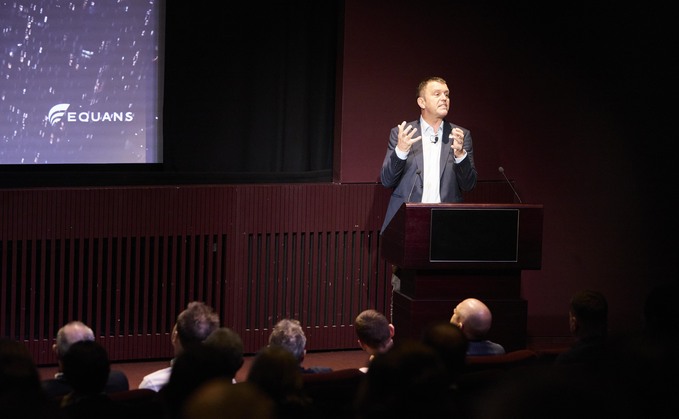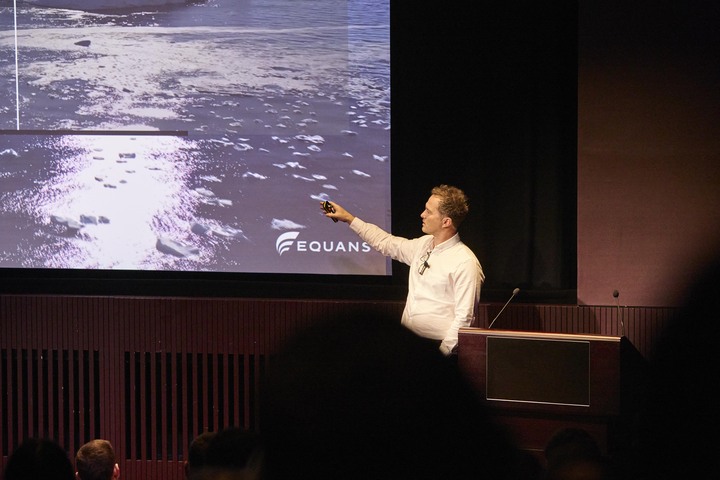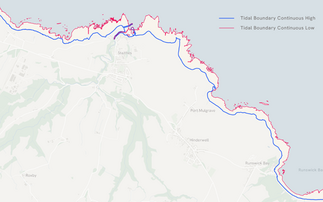
Nigel Topping speaks at an event hosted by Equans UK & Ireland / Credit: Equans UK & Ireland
At a recent event hosted by Equans UK & Ireland senior executives explored how businesses and public sector bodies need to get a better grip on escalating climate risks
How well do businesses really understand the scale of the physical risks they face from worsening climate impacts in the UK?
Not nearly well enough, according to Karl Limbert, director of strategy at Equans UK & Ireland, who at an event hosted by the global energy and services giant in London earlier this month presented a compelling case for much bolder corporate action on climate adaptation and resilience.
"I think in the UK we suffer from a kind-of climate exceptionalism - which is that we have weather, and everyone else has climate change," he argued. "But I really don't think that is the case."
Intensifying tropical storms, devastating wildfires, melting glaciers, crop-killing droughts, deadly floods, and overheated infrastructure - these are the sorts of incidents that are sure to feature heavily in many of our worst climate nightmares. But perhaps far too often we envisage the location of those nightmares in other parts of the world, and in doing so fail to fully appreciate the shape and scale of the very real climate impacts that are already causing significant and costly harm on our own shores - even if they don't always grab headlines.
Take the recent torrential rain surrounding Valencia in Spain, which led to deadly floods that have killed more than 200 people, left more than 80 people still missing, and laid waste to homes, businesses, and infrastructure. Lives and livelihoods have been destroyed, and the devastation prompted 130,000 people to take to the streets to protest against the authorities' handling of the floods.
For some, it may be hard to envisage climate-driven devastation and disruption taking place on such a scale in the UK, but as Limbert pointed out, it need not take that much for unusual weather events to incur massively costly damages on British communities and infrastructure. Thankfully, the UK is yet to experience a disaster akin to that in Spain, but in July 2021 parts of London recorded 48mm of rain in a matter of hours.
"That was enough to shut Whipps Cross Hospital, completely overwhelm the road and rail network, and it racked up about £100m in loss and damage in only an hour," he said. "That is not unusual, and you definitely wouldn't want to get caught up in all that stuff. So it doesn't have to be Valencia to be really bad and really costly."
But despite these clear and present dangers, research suggests there remains a huge corporate blindspot around the need for climate adaptation. According to Equans, while three-quarters of businesses have increased investment in the net zero transition since 2021, a third have struggled to align their decarbonisation plans with other business priorities, such as climate adaptation. So, while companies are increasingly recognising the imperative and economic opportunity of decarbonising their businesses, too few are similarly recognising the imperative of climate adaptation. And, as a result, far too many firms are failing to grasp the huge opportunities that can flow from improving the resilience of their business, both today and in the future.
As Limbert emphasised, regardless of how rapidly the world reduces its greenhouse gas emissions going forward, a certain level of climate change and escalating threats are already baked-in to the planet's near-term future. "There's a lot of climate change in the pipeline, and therefore a lot of climate risk in the pipeline," he said.

Part of the problem, according to Limbert, is that our thinking around climate change is often linear, whereas the reality of climate impacts are anything but. It is impossible to forecast or calculate precisely what every fraction of a degree of warming will lead to in the immediate, medium and long-term, and these impacts will not materialise at a predictable rate.
"It's a combination of some really slow-moving processes and some really fast-moving processes, and none of it is linear," he said. "It is all stochastic and really difficult to model."
This unpredictability means climate risk remains poorly understood across much of the UK's built environment. "It is almost certainly systematically underestimated across the built environment, and those problems are beginning to become very evident," said Limbert.
Discussions and data on physical climate risk are still today largely absent from capital maintenance and compliance regimes, he argued, yet the UK has some of the oldest building stock in Europe, meaning it is in even greater need of upgrading than many neighbouring countries - both to adapt to physical climate threats and improve energy efficiency and install clean heating systems in support of emissions goals.
These are challenges that it makes sense to address in tandem. "If you're an organisation that's interested in energy efficiency and carbon mitigation and the broad net zero story, you're really missing a trick if you don't factor in climate risk to that now," he added.
Equans knows more than a thing or two about these very real climate threats. It manages more UK hospitals than any other facilities management firm and has supported hundreds of millions of pounds-worth of projects from its clients to enable the decarbonisation of public and private sector buildings and social housing projects across the UK.
Moreover, Equans has this year launched a new Carbon Shift service which harnesses their decades of decarbonisation expertise with the aim of providing a full lifecycle process to help clients deliver on net zero targets while also taking account of and boosting resilience against physical climate threats. Last week's event at Tate Modern on London's South Bank brought together executives from across the public and private sector to discuss a new service that promises to assess various climate risk scenarios, net zero goals, and options for financing adaptation and mitigation efforts, in addition to helping with the design and delivery of solutions, and monitoring and measuring their performance.
For the adaption and resilience component of Carbon Shift, Equans has teamed up with risk data specialist Climate X, which pulls together more than 300 different sources of climate data and projects it onto a digital twin of the planet, in order to produce forecasts for different climate scenarios and socio-economic pathways for almost any type of building wherever it is located. At the same time, it also works with another climate risk specialist - Provisico - which specialises in providing accurate forecasts of when and where a flash flood might occur to within a single metre squared at least 24 hours ahead.
The data can then be integrated with information on how a specific building is operated - such as electricity use, heating, air conditioning, and occupancy rates - to optimise company strategies for growth and decarbonisation. From there, Equans can recommend a range of bespoke resilience and decarbonisation measures to clients that can help to cut costs and risks, as well as grasp new opportunities.
Broadly, the company's hard-won advice to other companies with underpowered climate adaptation strategies is this: assess your business's physical and transitional climate risks, and use that detailed and hugely valuable data to take action as soon as possible to better prepare and guard against escalating risks.
"There are two things that any organisation, whether you're in the public sector or the private sector, need to be switched on to, and that's loss and damage," explained Limbert. "So if you do a climate vulnerability assessment, you will put yourself in a position to reduce by a significant amount the likelihood of loss and damage materialising across your estate. And if you're an organisation that needs to pay attention to operational resilience - which is every organisation - again you can do yourself a real favour performing a climate vulnerability assessment."
The event - titled Net Zero and Beyond: Delivering Decarbonisation and Climate Resilience - also saw a host of leading experts grapple with how organisations can best respond to rapidly growing climate risks.
Louise Alter, head of energy innovation at Equans UK & Ireland, underscored the importance of organisations integrating their climate adaptation and resilience plans into their net zero and nature strategies. "I think people are much further along in their journey of understanding net zero and how essential it is, but I think it's really important that people understand that net zero works hand in hand with adaptation," she said. "If we don't have adaptation we are missing a trick."
For example, one trick businesses often miss out on is the potential to reduce insurance premiums by taking action to reduce climate risk through adaptation measures, Alter claimed.
"The key is to use adaptation as we develop those roadmaps," she added. "How do you make sure that in every element of your net zero roadmap, you think ‘adaptation', so that the investment that you make today doesn't need to be made again in 10 years?"
Her fellow panellist James Rooke, managing director for Carbon Shift at Equans UK & Ireland, added that accounting for the financial benefits of climate adaptation would likely be key to businesses unlocking investment to boost their resilience alongside their net zero efforts.
"You've got two elements to it," he said. "There's net zero, where you can show revenue benefits and life cycle benefits and so on. But there's another side to that value stack, which is the avoided cost from the resilience point of view, which is an actuarial risk. That's a slightly different way of looking at things. Over a period of time, your business is likely to experience some sort of existential risk which can be monetised. So your business will shut down, or lose productivity, or lose operating hours, for example. And I think to it's the ability to combine all of those benefits and risks and come up with a value stack."
The day's keynote speech was delivered by Nigel Topping, the UK's former High-Level Climate Action Champion for COP26, and prior to that CEO of the We Mean Business Coalition, who is now a member of the Climate Change Committee (CCC) and a non-executive director of the UK Infrastructure Bank.
Topping further emphasised the dangerous persistence of linear thinking with regards to climate change and the net zero transition, all of which he said posed huge transitional and physical risks to businesses, financial markets, and entire economies.
"There are two feedback loops which drive non-linear change," he said. "One is the feedback loop between what we're doing [emitting greenhouse gases] and the planet, and the way that this risks pushing us past some really scary tipping points."
Scientists have warned these irreversible tipping points - such as methane emissions from thawing permafrost, mass rainforest die-off, melting polar ice sheets, and collapsing ocean currents - are hard to forecast, but if triggered can set in motion escalating levels of climate change that could have catastrophic consequences.
"It's not like one degree of warming is bad, two degrees is twice as bad, and three degrees is three times as bad," said Topping. "But unfortunately most of our thinking, both on the risk side and the opportunity side, is very linear."
Such linear-thinking has also meant many businesses and investors continue to overlook and under-estimate the economic opportunities offered by the net zero transition. Topping argued that the auto industry provided a case in point, where incumbent carmakers slow response to the advent of electric vehicles (EVs) allowed the likes of Tesla and China's BYD to steal a march on previously dominant brands such as Volkswagen and Toyota. Scores of companies that are now struggling to respond to booming demand for renewables and EVs have seemingly failed to learn lessons from the rapid adoption of modular technologies in the past, which have frequently enjoyed steep falls in production costs, he said.
"That process is really quite predictable," Topping reasoned. "And yet it's hardly ever been built into most people's forecasts, because most of the forecasts are based on economic models, which, in general equilibrium theory, can't deal with disruption. They assume that the future is a is an extrapolation of the past."
That is not to say by any means that exponential improvements in technologies, manufacturing efficiencies, and cost reductions are straightforward to achieve - can only be delivered with focus, ambition, data, and a clear-eyed sense of the market opportunity and precisely what you are trying to achieve, Topping argued. "I urge all of you to look ahead at where you're going," he told the audience. "Don't be overwhelmed by it - just see it as a fact of life. Choose the problems you are going to solve and the partners you are going to solve them with, roll your sleeves up and get on with it."
Unlike net zero, it is harder to set a clear target for climate adaptation, particularly given how difficult it is to gauge the precise nature of the worsening impacts that will come with a heating planet. But that uncertainty need not be a barrier to developing strategies that incorporate both rapid decarbonisation and enhanced climate resilience. On both fronts, the importance of taking action as quickly and methodically as possible is more obvious than ever.
Equans was a partner of BusinessGreen's Net Zero Festival.








